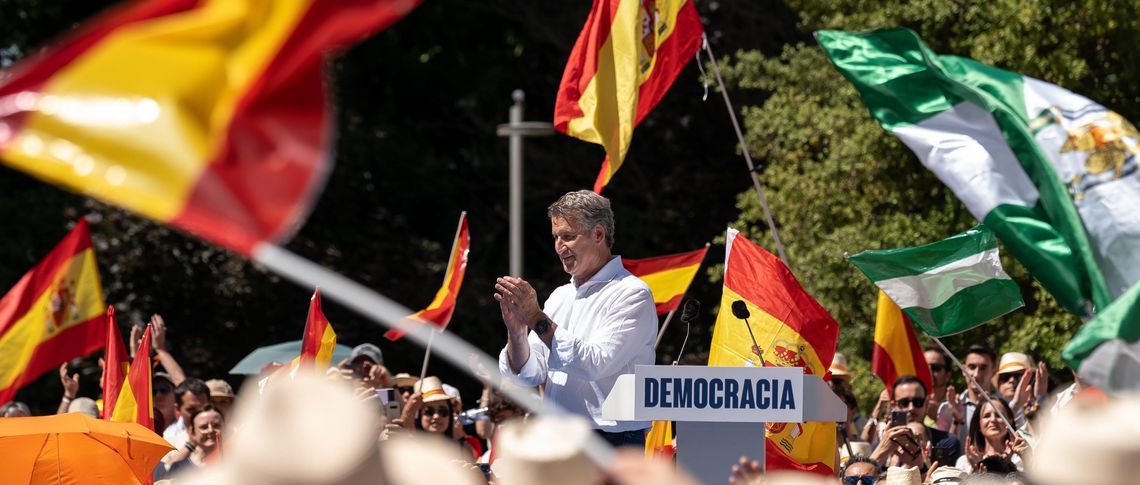The political wrangling over the ‘organic law on amnesty for the institutional, political and social normalisation of Catalonia’ has highlighted the tensions riving Spain. It is an extremely contentious law. Its supporters and opponents are pursuing antithetical approaches to a problem that is not just legal, but also – and primarily – political in nature and that is of the utmost importance for Spanish society as a whole, but especially for Catalonia.
What action should have been taken against those advocating Catalonia’s secession after their attempt failed? Although Spanish democracy proved able to fend off the secessionist assault, it left wounds that now have to be healed. Just arresting the leaders and criminal prosecution of thousands of supporters for what is, after all, a political conflict is scarcely an adequate remedy. A majority in the Spanish parliament take the same view.
The right, comprising the conservative Partido Popular (PP) and the right-wing populist Vox, continues to hold the view that the leaders should remain in custody and that all the accused in ongoing proceedings should be prosecuted. They reject any kind of concession to reconciliation.
The amnesty law was passed by an absolute majority in parliament, which is responsible for legislation. The right has accused the Socialist Party of relying on the votes of independence supporters. But it should be noted that in a democratically elected parliament, all votes have the same weight, although some might prefer to forget it.
The Constitutional Court – the sole competent institution – has laid down that the law is compatible with the constitution.
The right declared the law unconstitutional and has organised numerous street protests condemning the alleged ‘attack on democracy’. In parallel with this, it has waged a relentless social media campaign to proclaim the alleged unconstitutionality.
In the meantime, however, the Constitutional Court – the sole competent institution – has laid down that the law is compatible with the constitution. The assertion made by, among others, Cristina Ramirez, that it ‘failed the democracy test’, is thus not true. Nevertheless, the Spanish right is adamant and is now also attacking the president of the Court because he has refused to bow to their pressure. This is an odd way of defending the rule of law.
But regardless of its constitutionality, as a result of the amnesty law, alongside other government measures, the supporters of independence have lost their absolute majority in the Catalan parliament. Furthermore, political decisions have been set in train that have somewhat abated Catalonia’s social tensions. The new government led by Socialist Salvador Illa brought a number of issues to the table that had mobilised the independence movement for years and hampered Catalonia’s political and economic development.
These are complex questions that require regional consensus, agreements with the central government and legislative changes in the Congress of Deputies. They include the funding of the autonomous community, responsibilities for rail transport, expansion of Barcelona airport, decision-making authority over immigration policy and public investment in Catalonia, to mention only the most significant.
Most importantly, however, in the wake of the amnesty law and related decisions on the competences of autonomous communities, those who favour turning their backs on Spain are once more participating in parliamentary debates. Of course, they are doing so within the framework of their own political project, a project that we Socialists do not share, but do respect. Such recognition of the legitimacy of different schemes, engaging their representatives in dialogue, negotiating and having to reach a compromise, however, are the very stuff of parliamentary democracy.
Understanding Spain’s plurality
Two considerations in particular are key to understanding the political situation in Spain: the inauguration of Pedro Sánchez and the fundamental debate on Spain’s territorial organisation.
In the parliamentary elections of 23 July 2023, the Partido Popular became the largest party, with 137 seats. The King thus asked party leader Alberto Núñez Feijóo to try to win a majority in the Congress of Deputies. Feijóo failed, however, as his only ally was the right-wing extremist Vox party. No other parliamentary group was willing to sign up. The King then nominated incumbent Prime Minister Pedro Sánchez. The PSOE, with 121 seats, secured a majority with 179 votes, and Sánchez was re-elected head of government.
Since their defeat in parliament, the Partido Popular professes to regard Prime Minister Pedro Sánchez as illegitimate. It has questioned the validity of his inauguration and used its Senate majority to block government and Congress of Deputies initiatives, while relentlessly resorting to the courts – albeit unsuccessfully – to substantiate its views. All this is framed by a narrative based on false reports, half-truths and rumours. The upshot of all this is further polarisation and aggravation of relations between government and opposition. Such behaviour scarcely comports with the kind of democratic attitude we have the right to expect from a constructive party with ambitions of forming a government.
Sánchez and his government are not responsible for the deterioration of Spain’s democratic culture, but rather a right and extreme right who feel entitled to lord it over the country’s institutions.
As important as all this is for an understanding of Spain’s domestic politics, the real conflict concerns the self-understanding of the Spanish state. Because of its history, the strong sense of national identity in different parts of its territory, its different languages and cultural traditions, as well as its political geography, Spain is a very diverse country. The Partido Popular – like Vox – basically denies such pluralism and rejects any advance towards territorial self-determination out of hand. But that is exactly why Sánchez is prime minister, while Feijóo does not enjoy the confidence of parliament.
Defending democracy, as Cristina Ramírez rightly emphasises, is a pre-eminent task of the left. In my view, the same should apply to democratic rights. First and foremost, however, democracy is based on citizens’ trust. This trust is likely to dwindle if people begin to get the impression that their prosperity is falling, while wealth – and the opportunities that go with it – is becoming concentrated in ever fewer and ever richer hands. It is eroded when the right and the extreme right combine to foment fear and uncertainty. Trust is undermined when rumours, fake news, half-truths, hate speech and polarisation win out in our societies. In order to prevail, it requires both recognition and understanding of Spain’s plurality and people’s sense of identity in its different regions.
That is why it is crucial not to give in to the relentless and potent propaganda with which the extreme right is constantly bombarding us. Sánchez and his government are not responsible for the deterioration of Spain’s democratic culture, but rather a right and extreme right who feel entitled to lord it over the country’s institutions.
For a different view on this debate, see the article by Cristina Ramirez ‘Testing Europe’s democratic nerve’.






